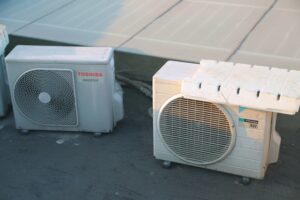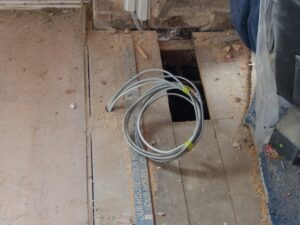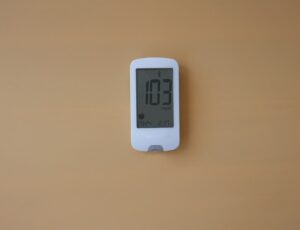Have you noticed your water heater leaking? Is it dangerous?
Yes, a leaking water heater is dangerous, posing risks such as scalding, electrical hazards, and the potential for explosions.
Not only can it damage your property, but it also poses risks such as scalding, electrical hazards, and even the potential for explosions. Understanding these dangers is crucial for preventing injury and avoiding costly damage.
Ignoring a leak can lead to worse consequences, including severe water damage and potential mold growth.
So, what should you do if you notice a leak?
Choosing the right professionals to handle the issue is key. At Excel Mechanical, we offer top-tier HVAC and plumbing services with a commitment to quality and customer satisfaction.
Whether it’s a minor leak or a more complex issue, you need a dependable team that understands your needs and budget.
When you suspect a leak in your water heater, it’s vital to act swiftly.
Reaching out to experts like Excel Mechanical ensures the situation is handled safely and efficiently, protecting both residential and commercial properties from the pitfalls associated with a leaking water heater.
In this blog, you will learn:
- Why a leaking water heater can be dangerous
- The common causes of water heater leaks
- The risks associated with water heater leaks and how to address them
Let’s break it all down and explore what you need to know about water heater leaks!
Understanding Water Heater Leaks
When you notice a leak in your water heater, it’s important to understand what’s causing it.
Water heater leaks can happen for a variety of reasons, and recognizing the cause is the first step in addressing the problem effectively.
By understanding the common causes of water heater leaks, you can act quickly to prevent further damage.
Common Causes of Leaks
A water heater can leak due to several reasons.
- One major cause is the corrosion of the tank. When the tank rusts, it can create small holes where water can escape.
- Another potential cause is excessive pressure buildup, which happens if the heater is set too high or if the exterior temperatures are cooler, causing the water inside to expand.
- Faulty temperature and pressure relief valves can also lead to leaks. These valves are designed to release water when the pressure or temperature is too high, but if they malfunction, they might start leaking.
- Inlet and outlet connections, where pipes connect to the heater, may also become loose over time, causing minor leaks.
Types of Water Heater Leaks
Water heater leaks can appear in different areas, and understanding where the leak is coming from can help determine how serious the issue is.
- Top leaks typically come from the inlet or outlet connections. These leaks are usually easier to spot and fix, making them less concerning.
- Bottom leaks, on the other hand, are more serious and often indicate that the tank itself is failing. If you spot water pooling at the bottom of your heater, it’s a good sign that your tank may be compromised.
Leaks can also occur around the pressure relief valve, which is a critical area for safety.
Is there water leaking from this valve?
If so, it could indicate that the valve is under strain and needs immediate attention to prevent further issues.
Risks Associated with Water Heater Leaks
A leaking water heater is more than just an inconvenience—it can lead to SERIOUS risks that impact the safety of your home or business.
Have you considered the hidden dangers a simple leak could cause?
From water damage to electrical hazards and even gas leaks, understanding the full scope of the risks will help you take the necessary precautions before the situation escalates.
Water Damage and Mold Growth
Water damage is one of the most immediate concerns when dealing with a leaking water heater.
What happens if a leak goes unnoticed for too long?
Even small leaks can cause significant damage over time, seeping into floors, walls, and other structures. This can weaken your home’s foundation and lead to costly repairs.
The damage doesn’t stop at the structure, either.
When water leaks into areas with poor ventilation, it creates the perfect environment for mold growth.
Mold loves damp, dark places—has your water heater been leaking for a while?
Mold can spread quickly and cause respiratory problems, allergic reactions, and other health issues, especially for sensitive individuals.
Addressing water leaks right away prevents these long-term health concerns and saves you from the trouble of mold remediation.
Electrical Hazard Risks
When water from a leaking heater comes into contact with electrical components, do you know how dangerous that can be?
Water and electricity don’t mix.
A leak can lead to short circuits, electric shocks, or even fires if the water reaches electrical outlets or wiring. This is especially risky in homes with older wiring systems, which might not have modern safety features.
What should you do if you spot a leak?
Switch off the power supply immediately, and call in a professional to assess the situation.
Excel Mechanical can inspect and repair any damage to your electrical system caused by the leak, ensuring your home stays safe.
Gas Leaks and Fire Hazards
Gas water heaters pose additional risks if they start leaking.
A ruptured valve or pipe can lead to gas leaks, which are highly dangerous. Gas leaks may result in fire hazards if the gas comes into contact with an ignition source.
It’s not worth taking chances.
Regular inspections and maintenance reduce the likelihood of such risks.
Timely interventions can identify potential problems before they escalate.
Health Implications of Leaking Water Heaters
A leaking water heater is not just a plumbing issue—it can also have serious health consequences.
Did you know that a small leak could lead to bigger health risks down the road?
From mold and mildew growth to the potential release of harmful gases like carbon monoxide, understanding the health impacts is key to keeping your home safe.
Inhalation of Mold and Mildew
Water heater leaks create a damp environment where mold and mildew can thrive.
Have you ever wondered how mold spreads so quickly in your home?
When moisture seeps into the walls, floors, or other areas, it encourages mold growth, which can release spores into the air. These spores can cause respiratory problems, especially for individuals with allergies, asthma, or weakened immune systems.
Could your home be at risk?
Symptoms like coughing, sneezing, and irritation of the eyes, nose, and throat are common signs of mold exposure.
Long-term exposure to mold can even lead to more serious health issues, including chronic respiratory problems. By addressing leaks promptly, you can prevent mold from spreading and protect your home environment.
Potential for Carbon Monoxide Poisoning
Gas water heaters come with a unique risk: carbon monoxide (CO).
Have you considered the dangers of carbon monoxide?
If there’s a malfunction or leak in your gas water heater, it could lead to the buildup of CO, a colorless, odorless gas that’s highly toxic.
Even low levels of CO can cause headaches, dizziness, and nausea, while higher concentrations can lead to unconsciousness or even death.
How do you protect yourself?
Regular inspections are crucial to ensure that your gas water heater is working properly and not leaking CO.
Installing CO detectors in your home adds an extra layer of protection.
Immediate Steps to Take
If you notice that your water heater is leaking, what should you do next?
Acting quickly can prevent further damage and mitigate the risks associated with the leak. The sooner you address the issue, the less likely you are to face costly repairs or health hazards.
Identifying the Leak
The first step is to figure out where the leak is coming from.
Common areas include the water supply line, connections, or the tank itself.
A simple way to check is to look for water pooling around the base. Use your hand to feel for moisture around the fittings and the tank body.
Understanding the cause of the leak makes it easier to decide on repairs. It might be a loose valve, a corroded pipe, or a faulty pressure relief valve.
Each cause will have specific signs, like rust or dripping.
Identifying these hints will help guide whether a simple fix is needed or if a professional should be contacted.
Shutting Off Power and Water Supply
Once you’ve identified the leak, the next step is to shut off both the power and water supply.
Why is this so important?
If you have an electric water heater, turn it off at the breaker.
If you have a gas heater, turn off the gas supply to the unit.
This helps avoid electrical shocks or gas hazards, which could escalate the situation.
For the water supply, locate the valve near the heater and turn it clockwise to stop the flow of water.
By stopping the water flow immediately, you prevent further leakage and minimize potential water damage.
Preventing Further Damage
After containing the immediate issue, focus on preventing further damage.
Mop up any standing water to reduce the risk of slipping and protect flooring and walls from water damage.
A fan or dehumidifier can help dry out wet areas.
If the leak is significant or complex, contacting professionals like Excel Mechanical is wise.
We offer exceptional HVAC and plumbing services tailored to your specific needs and budget.
Our experienced technicians ensure quality repairs and long-term solutions for both residential and commercial units.
Long-Term Solutions and Prevention
When dealing with a leaking water heater, what’s the best way to ensure the problem doesn’t return?
It’s essential to address the issue with long-term solutions that not only fix the leak but also help prevent future problems.
Regular maintenance and professional help are key to keeping your water heater in top condition.
Professional Repair or Replacement
When your water heater shows signs of leaking, involving professionals is often the best course of action.
Skilled technicians assess the problem and recommend appropriate solutions. They might repair the problem if it’s minor or suggest replacing the unit if the damage is extensive or the heater is old.
Replacing an outdated water heater can be more economical in the long run than repeatedly fixing ongoing issues.
Regular Water Heater Maintenance
Did you know that regular maintenance can significantly extend the life of your water heater and prevent leaks?
How often do you have your water heater inspected?
A little attention goes a long way—tasks like checking the temperature and pressure relief valve, inspecting for rust or corrosion, and draining the tank to remove sediment buildup can prevent leaks and other issues.
We recommend scheduling an annual inspection to catch minor problems before they become big ones. Regular maintenance not only keeps your water heater running efficiently but also helps avoid costly repairs or replacements down the line.
Wouldn’t it be nice to avoid the headache of an unexpected water heater failure?
Installing Leak Detectors
Leak detectors are an effective way to prevent major water damage from a leaking heater. These devices alert you to leaks before they become severe problems.
There are various types, including those that trigger an alarm or send notifications to your phone.
If your water heater is located in a basement, utility closet, or another area you don’t check regularly, a leak detector provides an extra layer of protection.
It’s a simple investment that can save you from significant repair costs and potential health hazards.
Legal and Insurance Considerations
Dealing with a leaking water heater doesn’t just involve repairs; there are also legal and insurance considerations to keep in mind.
Understanding your liability and how insurance might cover the damage can save you from unexpected expenses and complications down the line.
Liability Issues
If your water heater leaks and causes damage, have you thought about who might be responsible?
In some cases, homeowners are liable for water damage if they neglect to maintain their water heaters.
Regular inspections and maintenance reduce the likelihood of such issues, but if a leak is ignored and causes substantial damage, you could be held responsible for the costs.
Also, have you considered whether your water heater is compliant with local codes and safety standards?
Ensuring your system is up to code can prevent legal issues and help you avoid penalties in case of an accident.
Insurance Claims Process
If your water heater leaks and causes damage, your homeowner’s insurance may cover the repair costs.
But did you know that not all policies are the same?
Coverage depends on your policy, so it’s important to review your terms and contact your insurer as soon as possible.
To file a claim, you’ll need to document the damage with photos and provide records of any repairs.
Have you made sure to keep records of your water heater’s age and maintenance?
This can be helpful when filing a claim, especially if your policy has exclusions based on wear and tear or age.
While some policies may not cover damage from old or poorly maintained equipment, working with a trusted company like Excel Mechanical ensures your repairs are done correctly and in compliance with any necessary regulations, which can be crucial for a successful claim.
Frequently Asked Questions
Understanding the risks and issues related to a leaking water heater is crucial for safety and proper maintenance. Quick action can help prevent serious problems like explosions or water damage.
Can a water heater leak lead to an explosion?
Yes, a leaking water heater can potentially lead to an explosion. Why? If the temperature and pressure relief valve malfunctions, it can cause excessive pressure to build up inside the tank, which could eventually lead to an explosion. That’s why regular maintenance and inspections are essential to avoid this serious risk.
Are there any immediate dangers associated with a water heater leak?
Immediate dangers of a leaking water heater include water damage, loss of hot water, and possible electric shocks if the water contacts electrical components. Swiftly turning off the water supply and power can reduce these risks until a professional inspects the unit.
Is it advisable to use shower facilities when dealing with a water heater leak?
It’s best to avoid using the shower while your water heater is leaking. Why? Continuing to use the water heater while it’s leaking can make the issue worse, leading to more damage or hazards. It’s always better to address the leak first to minimize risks and avoid further complications.
What are the critical danger signs to look for in a leaking water heater?
Critical signs of danger include water pooling around the heater, unusual noises, a faulty pressure relief valve, and water temperature fluctuations. Any sign of steam or water above the heater’s normal level indicates you should contact a professional for an evaluation.
Could a leaking water heater pose a risk of starting a fire?
While rare, a leaking water heater could pose a fire risk, especially if water reaches electrical components. Always ensure the area around the heater is dry and free from combustible materials. If you notice any burning smells or smoke, seek professional help immediately.
What should be the level of concern if a water heater is leaking from the bottom?
If you notice water leaking from the bottom of the water heater, it’s a sign of a serious issue, typically a failing tank. Have you checked for rust or corrosion at the bottom of the tank? This kind of leak is usually more severe and can lead to significant water damage. It’s best to call a professional to assess the situation and determine whether it’s time for a replacement.




